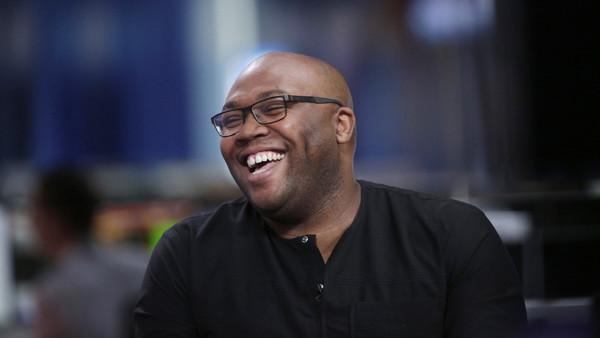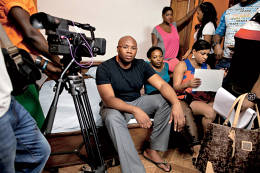From ‘Netflix of Nigeria’ to ‘Nollywood’ producer
When 36-year-old Nigerian entrepreneur Jason Njoku talks about embracing failure, he is speaking from experience. He had 10 start-up dead ends before co-founding iROKOtv in 2010 in an apartment in Lagos. He looks back at them as blessings in disguise.

“I have the inner confidence to walk away from the crowd and chart my own course because whatever I go through is nothing compared to what I went through then, in what I call my ‘dark days’,” he smiles. Those ill-fated ventures – a T-shirt company, a student magazine, another title aimed at twenty somethings – meant he spent more time than he would have liked living in his mum’s basement in London.
“I didn’t have a girlfriend for eight years,” he says, explaining that although he was living in the UK, he knew he wanted a Nigerian partner, and that prospects for marriage were slim while he was poor.
Many fellow Nigerians have the requirement of financial security in a potential partner “for necessity’s sake”, he says, but he regrets the implications for entrepreneurship, which can involve lean periods amid the successes.
He is speaking in iROKOtv’s Lagos headquarters, in a multi-storey building with bright pink accent walls and dozens of young engineers and customer service specialists diligently working. In a dark tailored kaftan and trousers, Njoku exudes quiet confidence.
His company, iROKOtv, has flourished by satisfying the African diaspora’s love for Nigeria’s “Nollywood” film industry, second only to India’s Bollywood by number of films produced. It has also won the confidence of investors, raising $40million in its five years of existence from backers including Goldman Sachs and CanalPlus of France.
Having given subscribers Nollywood-on-demand online, wherever they are, iROKOtv is advancing on two fronts.
First, it is making its own content in order to achieve a higher quality than the local standard. The gamble is that viewers are ready to pay for slicker production values.
Second, although the company’s original product – a Netflix-like subscription to thousands of Nigerian films and television series – is still mainly used by the African diaspora, Njoku believes its future is on the African continent, where Nollywood is popular from Tanzania to Ivory Coast. Diaspora subscribers, mainly in the UK and US, pay $50 a year, while in Nigeria the price is 3,000 naira, less than $10 – more affordable to locals.

Having pioneered the way Nollywood is watched online, iROKOtv raised $19m in January and founded Rok Studios, led by Mary Remmy Njoku, Njoku’s wife and a Nollywood star. Nollywood productions are typically shot quickly and on a shoestring budget. Rok Studios, which has invested in high quality cameras, is making an increasing number of the 200 films and dozen or so TV series that iROKOtv will offer on its website and mobile app this year. Titles include Desperate House Girls and Birthmark.
That has meant taking on more production staff in Nigeria, where the movie industry employs 1million but often lacks capacity to produce content of the polished style the diaspora wants. This means “a lot of it has been learning on the job”.
His co-founder, Bastian Gotter, stays mostly in Nigeria but Njoku spends a lot of time at the New York office – where “I’m actually the head of product” – to stay in touch with engineers working on the iROKOtv app, and in London.
“We’re really driving home that we have something worth paying for,” he says, turning to his computer to play a promotional video featuring recent TV series, some of which tackle, as he puts it, “meatier issues” than typical Nollywood fare. Reactions from subscribers to Rok Studios TV series have been favourable, he says.
The initial business plan of Njoku and Gotter, a friend from when he studied at the University of Manchester in the UK, was simple, low tech and cheap. With three employees, they scoured DVD stalls in the open-air markets of Lagos, and then saved and uploaded them to YouTube.
The idea was to put as much content as possible online for the 50m-strong Nollywood “global community” who follow the film industry, which churns out dozens of titles a week, such as Recharge Card and The Village Boy I Love 2. They paid the producers of low-budget films for the rights to license the movies. “All we did was take the movies and digitise them.” They soon attracted advertising.
The business was profitable within two months, earning between $55,000 and $65,000 with minimal overheads. It drew the attention of Tiger Global, a US hedge fund that has invested in western tech companies such as Netflix and Apple. Njoku says iROKOtv’s first funding, of $3million, enabled it to scale up. “We spent that money in five months on content. We just closed our eyes and bought,” he says.
The company has not been profitable since it took investor funding to expand but aims to return to profit within the next couple of years.
They soon learnt that not all films are popular, and that persuading customers to pay for content they could get free online would require them to provide better quality output. This has proved expensive. “Today, we spend $7million a year on content. It’s definitely our biggest cost,” he says.
Another big cost is the engineering team, based mainly in New York. That part of the business is focused on addressing the growing number of Africans who access the internet through smartphones. McKinsey, the consultancy, predicts that half the continent’s 1.1billon people will have internet access by 2025, with a third of those using phones.
Like other African tech start-ups, iROKOtv is focusing on the smartphone as the way to connect with the hundreds of millions of young Africans who use their phones for work and play. However, he acknowledges that streaming via smartphone is still prohibitively expensive for many smartphone users in Africa, although costs are falling.
Njoku’s enthusiasm might seem at odds with the economic outlook for oil-dependent Nigeria, which has been affected by falling commodities prices.
His wife encourages him to take the long view. “She says, ’10 years ago it was worse.’ In that framework, I think in a decade things will be significantly better, my business will be in a completely different place,” he says.
He notes how mobile apps that did not exist 10 years ago, such as WhatsApp and Instagram, are driving internet use in Nigeria, which is Africa’s largest country by population, with 180million people. “I’m looking forward,” he says.
The tabular content relating to this article is not available to view. Apologies in advance for the inconvenience caused.

